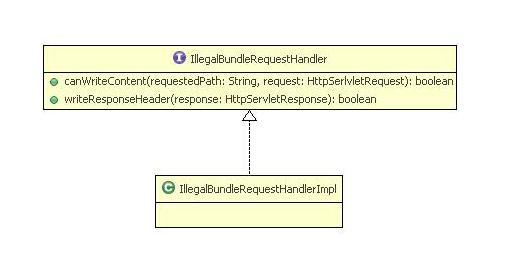Jawr illegal bundle request handler
Since the version 3.3, Jawr introduced a new configuration setting which is the strict mode.
This strict mode refers to the way how Jawr handles the bundle request where the bundle exist in Jawr but the identifier of the bundle (hashcode) doesn’t match the existing one.
This case can happen when you have an application which runs on 2 servers, and that you’re deploying a new version of your application on one server, while the other is still running.
It can happen that the user retrieve the content of the page from one server, and try to retrieve the bundle resources from the other. If the requested bundle has different between the 2 servers, Jawr will receive a request for a bundle which exists but where the hashcode is incorrect.
If you set the strict mode property in your Jawr configuration file to true, Jawr allows you to define the handler for such request. Here are the properties which you can use to handle the strict mode :
| Property name | Type | Purpose | Default value |
|---|---|---|---|
| jawr.strict.mode | Boolean | Enable/disable strict mode for bundle request. | False |
| jawr.illegal.bundle.request.handler | String | The class name of the handler for illegal bundle request. | net.jawr.web.servlet.IllegalBundleRequestHandlerImpl |
 The IllegalBundleRequestHandler defines the following methods :
The IllegalBundleRequestHandler defines the following methods :
/**
* This method can update the response header and
* returns true if the header has been written
* and false if Jawr must write the response header.
* @param requestedPath the requested path
* @param request the request
* @param response the response
* @return true if the header has been written
* and false if Jawr must write the response header.
* @throws IOException if an IOException occurs
*/
boolean writeResponseHeader(String requestedPath, HttpServletRequest request, HttpServletResponse response) throws IOException;
/**
* This method should return true if Jawr should send back the content of the bundle.
* @param requestedPath the requested path
* @param request the request
* @return true if if Jawr should send back the content of the bundle.
*/
boolean canWriteContent(String requestedPath, HttpServletRequest request);
- boolean writeResponseHeader(String requestedPath, HttpServletRequest request, HttpServletResponse response)
This method is used to update the response header is needed. It must returns true if the response header has been written and false to let Jawr handles the response header like for correct bundle. - boolean canWriteContent(String requestedPath, HttpServletRequest request)
This method is used to determine if Jawr should send back the matching bundle content or not.
Jawr default IllegalBundleRequestHandler implementation
Jawr provides a default implementation of the IllegalBundleRequestHandler, which returns a 404 if the bundle hashcode doesn’t match.
/* (non-Javadoc)
* @see net.jawr.web.servlet.IllegalBundleRequestHandler#writeResponseHeader(java.lang.String, javax.servlet.http.HttpServletRequest, javax.servlet.http.HttpServletResponse)
*/
public boolean writeResponseHeader(String requestedPath,
HttpServletRequest request, HttpServletResponse response) throws IOException {
response.sendError(HttpServletResponse.SC_NOT_FOUND);
return true;
}
/* (non-Javadoc)
* @see net.jawr.web.servlet.IllegalBundleRequestHandler#canWriteContent(java.lang.String, javax.servlet.http.HttpServletRequest)
*/
public boolean canWriteContent(String requestedPath,
HttpServletRequest request) {
return false;
}
Custom IllegalBundleRequestHandler implementation
To create your own IllegalBundleRequestHandler, you must create a class which implements IllegalBundleRequestHandler.
Then in the Jawr configuration file you should add the following setting:
jawr.strict.mode=true jawr.illegal.bundle.request.handler=com.mycomp.jawr.MyIllegalBundleRequestHandler
Here com.mycomp.jawr.MyIllegalBundleRequestHandler is the class name of your IllegalBundleRequestHandler

